by Cara McClain
Stepping out of the plane, there was no air-conditioned gate to transition slowly into the ninety degree African winter weather. Seniors Katie Beirne and Katie Hyde descended down the stairs and took their first steps on Mali soil on the tarmac of the runway. Beirne’s mother and travel companion, Dr. Tammy Neblock-Beirne, was not with them, so they were not sure where to go next.
Amid the shouts in Bambara, Mali’s unofficial language, a man told the girls in French, Mali’s official language, to get on the bus a few feet away. Beirne and Hyde eventually understanding what he meant, climbed on the bus which took them to their gate.
“It was instantly warm, sticky and smelly,” Beirne said. “Africa smells. It smells like a lot of people living in a small space.”
Beirne, Neblock-Beirne, Hyde and a group of doctors, nurses and volunteers traveled to Mali for ten days on a mission trip organized by Medical Missions Foundation, an organization that provides surgical and medical aid to people in economically depressed countries.
Medical Missions
Neblock-Beirne has been involved with Medical Missions for eight years, and this trip was her sixth to Mali and her twenty-first with them overall. She travels with Medical Missions two or three times a year to perform surgeries or provide other medical care for one to three week periods each trip.
“Every country that you go to has a different need,” Neblock-Beirne said.
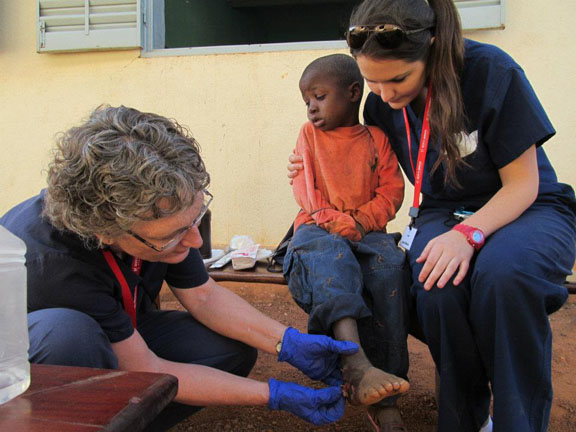 The most common surgery she and the two other surgeons performed was on the thyroid. Because of a lack of iodide in their salt, many people in Mali develop large goiters, benign growths on their thyroid. Neblock-Beirne said sometimes their thyroid can grow as large as their head.
The most common surgery she and the two other surgeons performed was on the thyroid. Because of a lack of iodide in their salt, many people in Mali develop large goiters, benign growths on their thyroid. Neblock-Beirne said sometimes their thyroid can grow as large as their head.
In addition to the goiters, the three surgeons performed many hysterectomies and removed hernias and other tumors, adding up to a total of 96 surgeries in five days.
Neblock-Beirne said without complaining, she would begin performing surgeries at eight in the morning and continue until eight or eleven at night. She said that is what she is there to do, care for the many people that travel to the clinic.
“Their word of mouth is better than our Facebook,” Neblock-Beirne said. “People come from miles, and we already have a list of people [for next year].”
According to Neblock-Beirne, out of the 1500 patients in the clinic the most common medical issues the staff saw were malaria, typhoid and parasites.
The Medical Missions team was prepared to deal with other kinds of medical issues as well. Hyde said a girl came to the clinic because she was incontinent, meaning she lacked control of her bladder. Those organizing the trip recruited a urologist specifically to help this girl.
As well as providing surgeries, the team of volunteers conducted a hand washing campaign, visiting seventeen schools to teach about the importance of keeping hands clean.
“We like to get involved in the community in other ways like in the schools and villages,” Neblock-Beirne said. “We want to provide them with something sustainable.”
According to Hyde, the children she encountered loved to hold her hand.
“They wipe with their left hand,” Hyde said. “You would hold someone’s hands and be like ‘That’s a left hand.’ I wore so much Purell, but it didn’t do much.”
By the numbers:
96 surgeries
Three surgeons
Five surgeons
41 total people on the trip
1500 patients in the medicine clinic
source: Dr. Tammy Neblock-Beirne
Malian Culture
Mali, located in the northwestern portion of the African continent, is home to approximately 14 million people, of whom 90% are Muslim.
Hyde said the call to morning prayers woke them up sometimes, and when they were in the capital city Bamako, speakers projected the sound of chanting in Arabic at the five times for prayer each day.
Mali’s literacy rate is 26%, and the majority of the population make their living as farmers, often growing cotton or peanuts.
One night, Beirne and Hyde sat down to speak with a couple of peanut farmers, learning how to make tea.
“We were asking them about peanut farmers and life in general,” Beirne said. “All of sudden they asked, ‘Are you married? What are the steps to marry one of you?’ We were like, ‘What?’ We explained to them that you had to date first.”
Hyde explained that asking these men to speak with them appeared forward, but then again, asking for their hand in marriage was forward too but not uncommon from their experience.
One day while in the market, a man approached one of the Notre Dame de Sion seniors who also went on the trip. He asked her, “How do we marry you?”
Confused, they explained to him that in America people date each other before marriage, leaving him confused.
Both Beirne and Hyde incited the love of a couple of Malians.
When she was working in the hospital, Hyde noticed a man watching her as she walked past him. He stopped her and began speaking in Bambara. She apologized and said she could not speak it.
“He kept talking and kept talking, and then he stopped and said ‘I love you,’” Hyde said. “I was like bye because there was nothing I could say to that.”
Another day, a girl had skipped her own lunch to come tell Beirne that she loved her. Unsure what prompted this, Beirne said she had only asked the girl what her name before she professed her love.
“I said it in Bambara and that’s all we know: hello and how are you?” Beirne said.
Beirne and Hyde made a point to learn as much of Bambara as they could to communicate with the people they met.
“When [Malians] speak its like a low mumble,” Beirne said. “When we speak it, because we have a terrible accent, they would laugh so hard at us.”
One of the words Beirne and Hyde used with the children was “ta” meaning “go.”
“Sometimes the kids would follow us to the bathroom so we’d be like, ‘Seriously, ta,” Hyde said.
Bambara does not have commands like in English, so they were being rude telling the children to leave.
[nggallery id = 194]
“Boi’s Story”
Mali is listed as one of the top ten poorest nations. According to Neblock-Beirne, the average income is about $2000 a year.
“There’s no way to explain the poverty,” Neblock-Beirne said.
Because of this, very few people can afford health care.
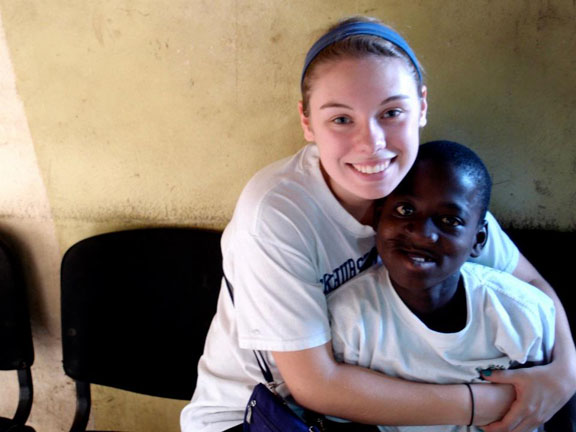 “In the capital city they have hospitals that have advanced state of the art types of care, they are all allowed to have access to that care but have to have some means to pay for it,” Neblock-Beirne said.
“In the capital city they have hospitals that have advanced state of the art types of care, they are all allowed to have access to that care but have to have some means to pay for it,” Neblock-Beirne said.
In 2008, Neblock-Beirne met a young boy named Boi (pronounced Boo-waa) with a large tumor on his face. Understanding the complex surgery he needed, she brought him back to the United States with her to have his tumor removed.
According to Neblock-Beirne, because of the health care system, many Malians still practice voodoo to cure their illnesses.
“With Boi, when we first met his family, they had spent all of their money, which was $200, on some black magic trying to get rid of his tumor” Neblock-Beirne said.
Boi’s surgeons at the KU Medical Center operated on his tumor and facial reconstruction for 23 hours April 16, 2008. Boi remained in Kansas City recovering, meeting weatherman Gary Lezak, riding the Boomerang at World’s of Fun and visiting schools, until July of 2008.
Neblock-Beirne, her friend Ms. Abigal Hayo and other contributors compiled a book chronicling Boi’s surgery and recovery called “Boi’s Story.” With photos and daily descriptions of Boi’s activities, this book comprehensively covers Boi’s three month journey.
Since that initial summer, Boi has traveled back to Kansas City to stay with Beirne’s family during the summer. This time around, Beirne stayed in Boi’s village of Daganbougou to see what his life is like when he is not with them.
Neblock-Beirne said one of the main reasons she continues to travel to Mali is because of Boi.
“We’ve fallen in love with him and bring him back every year,” Neblock-Beirne said.
Leaving Mali
Beirne and Hyde had become accustomed to assisting people daily and felt the satisfaction of serving others. They were accustomed to performing any task assigned to them in the clinic. They were accustomed to having a different child holding onto every one of their fingers. They were accustomed to the ring of red dirt around their ankles and hands, no matter how much Purell they used. They were even accustomed to sleeping, swathed in mosquito netting, on the dirt floor of their hut.
Once back in Kansas City, both Beirne and Hyde longed to return to Mali.
As she lay on her bed, in her room four times larger than the huts she saw people living in, Hyde cried herself to sleep.
“I don’t care that its a dirt floor,” Hyde said. “I wanted to be back [in Mali]. I would have given anything at that moment to be back.”
When she returned to school, she found herself impatient with other girls and herself.
“Just hearing girls complaining about little things, it’s just like now the experiences in Africa are still in the back of my mind,” Hyde said. “Every time I’m about to complain that there’s no toilet paper or soap that smells bad in the bathroom I’m just like, ‘There are people that have so much less than I do.’”
Beirne experienced a similarly difficult readjustment upon returning to school.
“Everyday that I was [in Mali,] we did something productive,” Beirne said. “Now when I’m back at school, I feel like I could be doing something so much better with my time. Everyone asks me [about Mali], and I’m like, ‘It’s amazing and I would go back tomorrow.’ I would live there if I could.”
Hyde said they made a pact to return to Mali next year.
“We’ll meet in Paris for a day for a coffee and a croissant, and then we’ll go to Bamako,” Hyde said. “I think we’ll keep it.”
Beirne now understands why her mother loves traveling to Mali.
“[Mali is] such a big part of me now that if I hadn’t gone, I would be totally different,” Beirne said. “Its’ something I want to keep doing.”



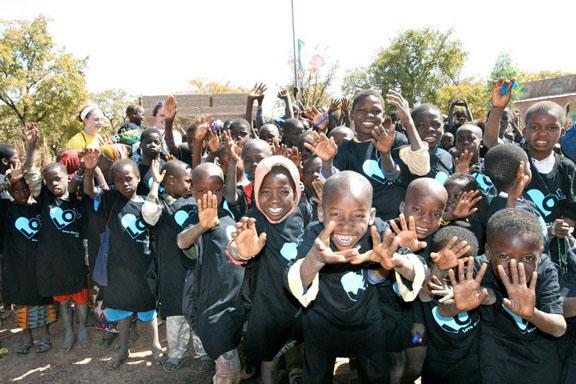



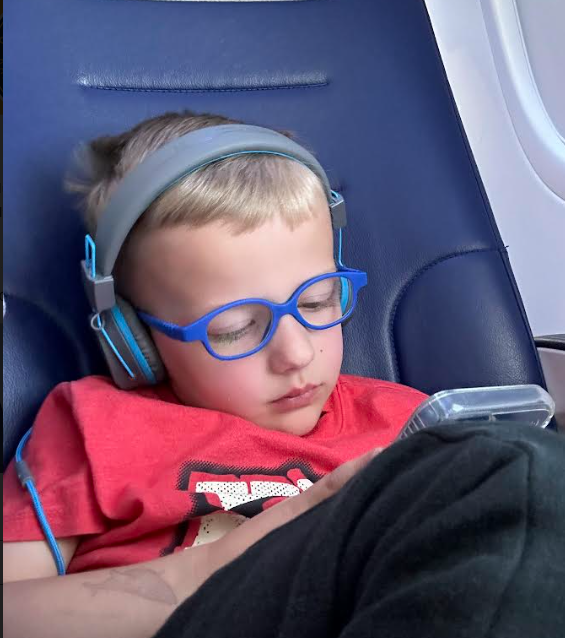
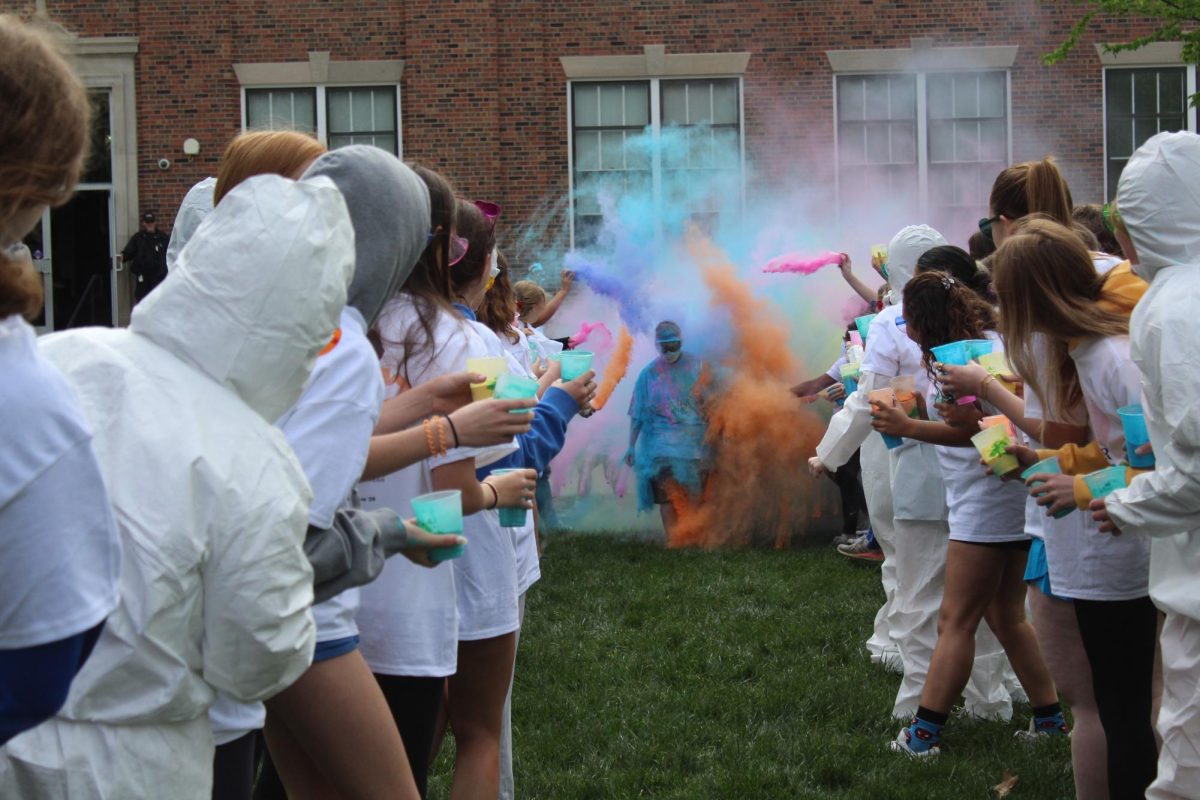



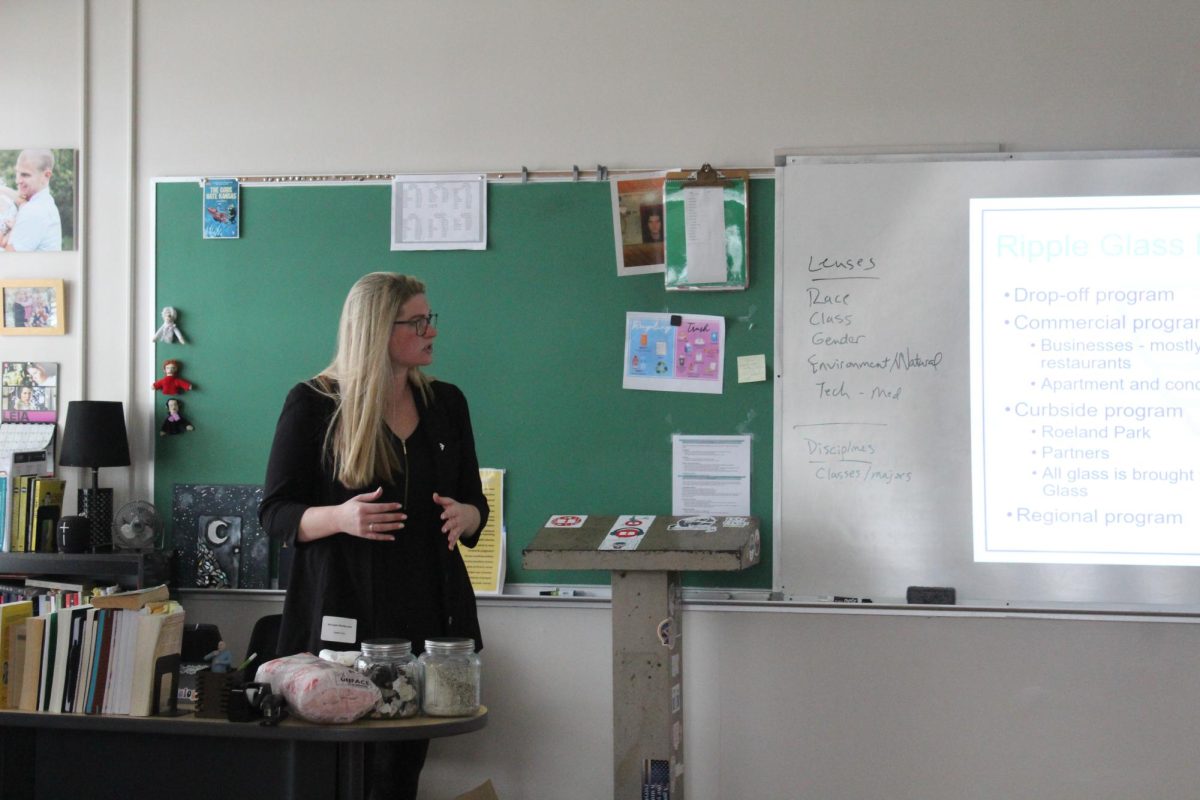
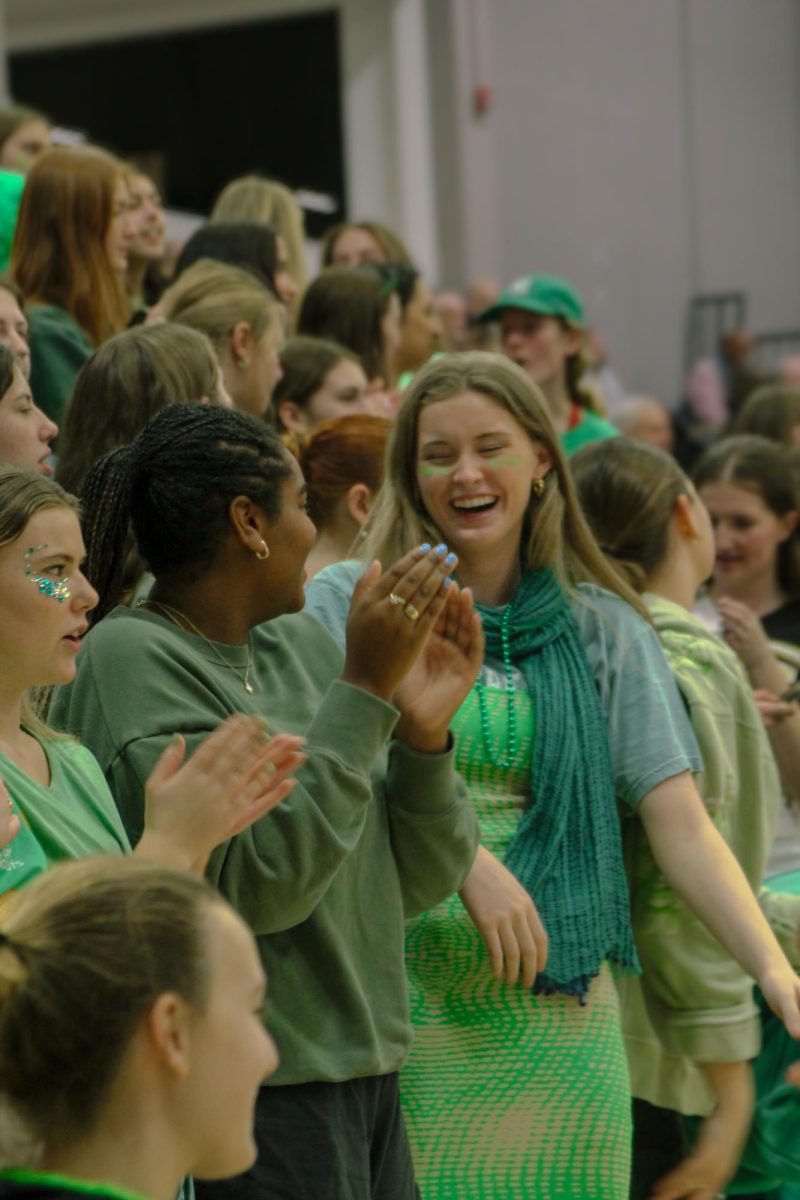
Chelsea Birchmier • Feb 9, 2012 at 10:24 am
Wow, this is a great story Cara!